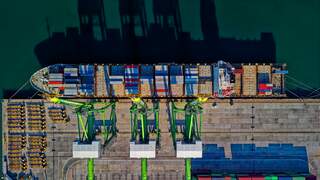
© Pexels / Tom Fisk
#PowerUpEurope: Towards sustainable mobility, competitive logistics and global connectivity
European perspective on mobility and logistics
The Connecting Europe Facility must be significantly increased in the next long-term EU budget (2028-2035) in order to expand and finance reliable and efficient transport infrastructure and intermodal interfaces. The EU has a responsibility to comprehensively promote the potential of the mobility sector for climate protection. To this end, the Fit for 55 package must be consistently monitored, implemented and, if necessary, readjusted and the potential for digitalisation exploited. The principle of technological openness must be maintained.
Road transport
The goal of defossilising road transport requires the rapid market ramp-up of alternative drive systems and renewable fuels in order to achieve the ambitious CO2 fleet limits of the Fit for 55 package. This can be achieved through the rapid expansion of charging and hydrogen refuelling infrastructures, among other things. In addition, clear CO2 price signals must be set in road transport via the new EU emissions trading system ETS 2 and CO2-orientated energy taxation of fuels; new initiatives to revise the EU Energy Tax Directive are urgently needed for this. In addition, the legal framework for weights and measures in road freight transport should be optimised to enable additional efficiency gains and CO2 savings in the transport sector.
The EU's Global Gateway connectivity initiative has so far provided for insufficient investment for all modes of transport. An increased investment boost for the resilient Trans-European Road Network (TERN) and the promotion of low-carbon, robust and durable construction methods are therefore urgently needed.
Rail transport
In the new legislative period, a reliable and high-quality European rail infrastructure must become a priority through more digitalisation and interoperability. In addition, the attractiveness and competitiveness of combined transport should be strengthened by modernising the legal framework with a focus on standardisation and mass suitability.
Maritime transport
Now that the EU has missed the opportunity to make the extension of the ETS to maritime transport competitively neutral, measures should be taken to strengthen international competitiveness, promote climate-neutral shipping and ensure the availability of renewable fuels. It is also important to maintain the resilience of maritime supply chains and competition in the sea freight market.
More detailed information and detailed recommendations for action can be found in this position paper.



